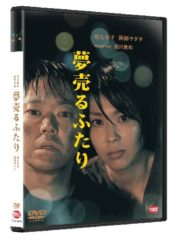REVIEW: DEAR DOCTOR and DREAMS FOR SALE [DVD]

Miwa Nishikawa’s Deceitful Worlds
Dear Doctor / Yume Miru Futari (ディア・ドクター / 夢売るふたり)
Directed by Miwa Nishikawa (西川美和)
Japan | 200 mins / 147 mins
Japanese with English subtitles
Miwa Nishikawa, a protégé of Hirokazu Kore-eda’s before forging her own reputation, received critical acclaim for her sophomore feature Sway (2006), and proved she was adroit at handling bigger productions with Dear Doctor (2009) and Dreams for Sale (2012). Prior to the release of her latest feature, The Long Excuse (2016), on October 15 in Japan, Tokyo Filmgoer continues revisiting Nishikawa’s earlier works on DVD, with English subtitles.
 Nishikawa’s third feature, Dear Doctor is a likable film for everyone. Winning multiple domestic awards, this Japanese Academy Awards-favorite is partially infused with the pristine humanism of Yoji Yamada. Through a heartwarming relationship between the only doctor in town and his townsmen, Nishikawa questions what is most essentiall in our lives.
Nishikawa’s third feature, Dear Doctor is a likable film for everyone. Winning multiple domestic awards, this Japanese Academy Awards-favorite is partially infused with the pristine humanism of Yoji Yamada. Through a heartwarming relationship between the only doctor in town and his townsmen, Nishikawa questions what is most essentiall in our lives.
The film starts with the disappearance of Dr. Ino (Tsurube Shofukutei) in Kamiwada, a small country town where half of the citizens are his senior patients. Assuming the doctor simply abandoned them or had accumulated enough savings to start a private practice, people are reluctant to speak up about the doctor, as a search begins. Meanwhile, the main narrative is conveyed via a long flashback by Keisuke (Eita), a spoiled medical resident with a fancy red car, who has arrived in town to intern under Dr. Ino. Although Keisuke is gradually impressed with Ino’s kindness and sincerity, Nishikawa drops a number of hints about whether Ino is actually a legitimate doctor.
In her third feature, Nishikawa’s humanism is milder than the previous two, making the point that benevolence is what matters most in consoling wounded souls. Fortunately however, Nishikawa cleverly avoids the dangerous trajectory of Patch Adams (1998). In the end, both Kamiwada townspeople and outsiders are the ones who created false images of this charitable, humorous doctor in the countryside; elderly patients simply needed whatever doctor they could get, and city folks imagined that any doctor working in a rural area must be pure-hearted and considerate. As with her previous feature Sway, Dear Doctor is quietly underlaid with Nishikawa’s consistent comparisons between the city and the countryside.
 Nishikawa returns to cynical comedy in Dreams for Sale, her fourth feature. This Toronto International Film Festival premiere is again an appealing movie for every audience, but never stops reflecting on the society in which the film was made. By introducing marital swindlers who ensnare unhappy women for money, Nishikawa blurs degrees of happiness and asks whether dreams are purchasable or not.
Nishikawa returns to cynical comedy in Dreams for Sale, her fourth feature. This Toronto International Film Festival premiere is again an appealing movie for every audience, but never stops reflecting on the society in which the film was made. By introducing marital swindlers who ensnare unhappy women for money, Nishikawa blurs degrees of happiness and asks whether dreams are purchasable or not.
An accidental fire burns down a restaurant owned by a seemingly happy couple, Kan (Sadao Abe) and Satoko (Takako Matsu). While Satoko calmly accepts the situation and starts working at a noodle shop, Kan idles his time away and becomes a professional nuisance. By the time the husband reveals the ugliest side of himself after gambling, cheating and lying, the wife unveils a concealed, malignant self, a secret side of Lady Macbeth. Satoko then becomes a controlling force of Kan’s actions, forcing him to bamboozle unfortunate women in order to get enough money so they can rebuild their restaurant.
As can be easily imagined, however, the more money Kan deceitfully “earns,” the guiltier he feels. Interestingly however, Satoko’s obsession with deceiving women is not only caused by financial interest, but by a kind of vengeful spirit. Nishikawa cogently implies that the suffering of an unsatisfied wife strengthens the duality of the character. Nishikawa frequently introduces imperfect, untrustworthy figures, from Wild Berries to Dreams for Sale, but at the same time attempts to gradually reveal the psychology of the characters and society they live in.
Film itself is also a deceitful medium of sorts, with money galore involved in its production and distribution. But with the deceits at the heart of Dear Doctor and Dreams for Sale, Nishikawa presents good dreams for sale, and audiences should be happily fooled along with the characters.
By Kenta Kato
Kenta Kato is a Tokyo-based writer, film critic and festival programmer, currently working on a Master’s degree in Film Studies at Waseda University.


・字幕: 日本語, 英語 means subtitles with Japanese and English,
・英語字幕版 means with English subtitles.
